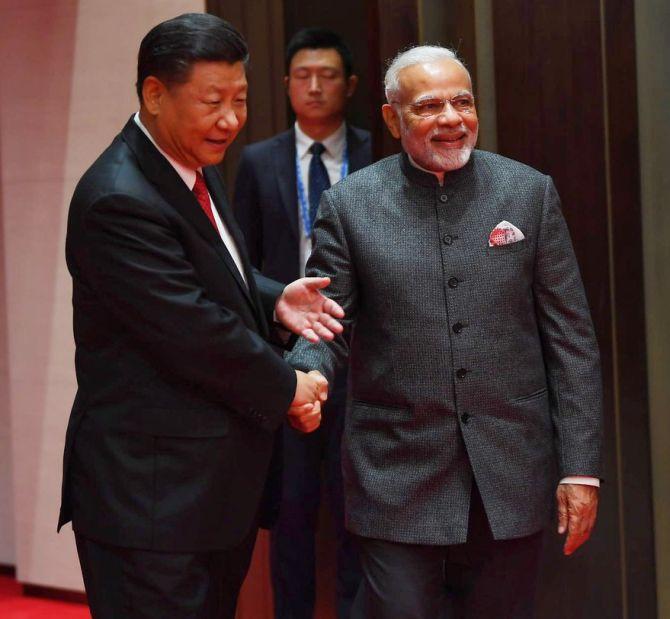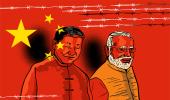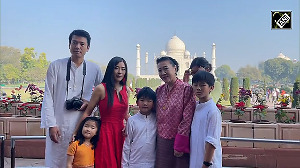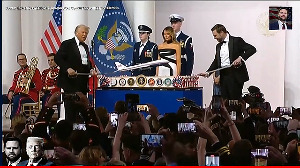'We must compartmentalise issues, ensuring that one disagreement does not sour everything,' advises Ambassador Kishan S Rana.

Where do we stand in our fraught relations with Beijing, after the two-day Modi-Xi summit-fest in Wuhan at the end of April 2018? The summit was a success, with 'informality”' the keyword.
Thus, no formal concluding statement published. No presser by the leaders either.
One consequence, surely intended: Scaling back public expectations. Quiet diplomacy must reclaim its space and silence.
What we have is a top-down process to resume confidence-building steps.
These include 'strategic guidance' to the armed forces to cool things on the border; deeper engagement across a wide spectrum; push on congruence areas in development cooperation; expanded cultural links; and harder effort at resolving the border issue.
And the next informal summit is planned for 2019, presumably before India is locked in general election mode.
Let us stand back and look at India-China prospects against the bilateral, Asian and global canvas.
First, take bilateral relations. We saw 12 months of nastiness on both sides, including India's boycott of the Beijing BRI Summit of May 2017, accompanied by sharp criticism of China's investments; that was followed by China's Doklam incursion.
In hindsight, New Delhi's reservation over Beijing’s massive infrastructure investments, often beyond the repayment capacity of the recipients, was justified.
Where we went off track was in letting that become a bilateral issue.
Second, direct Delhi-Beijing dialogue channels were blocked for a while. They reopened after September through careful actions on both sides, paving the way to the Wuhan summit.
Surely, uninterruptible dialogue is crucial to this relationship.
Third, can we not focus on issues of real benefit?
Thus, with India far from producing civilian-use nuclear equipment, why should NSG membership matter so much?
Fourth, having identified 'development' as a real shared value for the two countries, should we not build on that link, including the highly innovative forum of State Provincial Leaders, inaugurated in 2015?
PM Modi is right in stressing the bilateral and global value of the national developmental experience of the two countries.
Fifth, the recent success of Indian films in China bears out the thesis that this relationship can thrive at a popular level, regardless of official contemns.
Looking to Asia, several elements call for attention.
First, connectivity infrastructure is not the monopoly of BRI or China. A road or rail-line is secular in the traffic it carries.
Both to our west, to reach Central Asia, and in the east to reach SE Asia, we will have to use China-built connectors and infrastructure.
So why not get inside the tent, to win support for the idea that much of what BRI is creating are 'global public goods' -- many others clearly share that notion.
A China-Nepal-India corridor is emerging -- why not consider and provide for rail and other project compatibility, or at least minimise dissonance?
This can be done without changing our posture on the China-Pak Economic Corridor.
Second, it is good that Beijing has agreed on a joint India-China project in Afghanistan. This is a small, unheralded success for Indian diplomacy.
It also offers evidence that regardless of rhetoric, Pakistan does not have a lock on Beijing's regional actions that touch on Indian interests. We need to work further on such possibilities in cool, undemonstrative fashion.
Third, look to how Japan, Vietnam and South Korea have handled their profound distrust of China.
For instance, for years, China and Japan have held informal vice-foreign minister talks, well out of the limelight.
Should not such key dialogue in India be entrusted to professional diplomats?
On the broad international canvas similar congruence, actual and potential, exists.
First, Beijing now seemingly accepts India as a rising power.
China has re-evaluated New Delhi's current and future weight, the more so against its own deeper, enduring contestation with both the US and Japan.
Second, in the global balance, and on trade, climate change and the role of new emerging States in the international economic system, the positions of the two countries are proximate, though not identical.
That was clearly a major plank at the Wuhan summit. That needs sustained exploration.
Third, perhaps we too have come to realise the limits of our interest identity with the 'Quad', and over-reliance on Washington DC.
Finally, should we learn something from the past year's experience?
Avoid gratuitous offence to any State, major or minor.
Power asymmetries are a fact of life.
We must adjust ourselves to inequalities, differences.
Also, we must compartmentalise issues, ensuring that one disagreement does not sour everything.
We, especially our media, need deeper trust in India's capacity to manage international affairs. We should also build up our diplomatic capacity.
The legacy of 1962 conditions the way many Indians perceive China. We need to reassess the errors and miscalculations of both sides.
Finally, consider this: In the 1960s and 1970s, China's economic capacity equalled, or was just a bit bigger than India's. But behind that lay a huge, unseen difference.
China had already implemented thoroughgoing reform of its education and health system; its status on literacy and workforce skilling was way ahead of ours.
These are India's unfinished domestic social tasks that beg for transformative action.
Kishan S Rana, a former ambassador, author, and teacher, is Emeritus Fellow, Institute of Chinese Studies, Delhi











 © 2025
© 2025